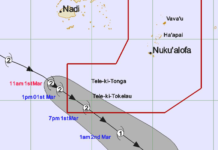A private ferry operator in Tonga has warned the public to be vigilant after it discovered what appeared to be counterfeit banknote in its payment services.

Tofā Ramsay Shipping which operated Tonga’s domestic shipping services made the warning this morning.
Copies of the apparent $50 pa’anga bill were shared on the company’s Facebook account with an accompanied warning in Tongan saying the counterfeit currency appeared to be printed copies of original pa’anga bills.
The counterfeit pa’anga was spotted during the company’s services this morning, a staff has confirmed to Kaniva News.
Tōfā Ramsay Shipping operates the inter-islands service.
It included a barge that can transfer vehicles, cargo and passengers to beaches and islands that do not have wharves.

In 2022, two men were arrested in the seizure of counterfeit Tongan currency from a home at Popua.
At the time Tonga Police asked the public to report any fake currency in circulation.
Tongan authorities could not be reached for comment.
How to spot fake pa’anga notes?
In 2017, the Tonga National Reserve Bank found $50 notes, prompting a public warning.
It that incident, the bank said it received $50 paánga notes of the new design currency (King Tupou VI series) confirmed to be counterfeit notes.
It also said, these counterfeit notes lack the following security features present in every genuine $50 pa’anga note:
1. the watermark of the King’s effigy which can be clearly seen when it is held up to the light;
2. a shiny silver thread shows as a window on the front of the note but as a more solid silver on the back of the note, showing images of the national medal.
The bank then said: “The public is hereby advised to check all notes particularly the $50 new design note before accepting them. Counterfeit notes carry zero value and will not be accepted by the banks or the Reserve Bank”.







